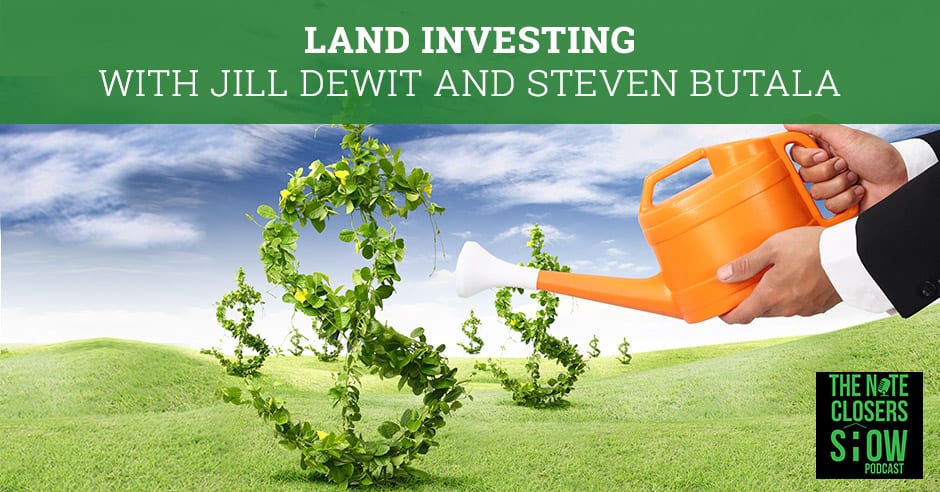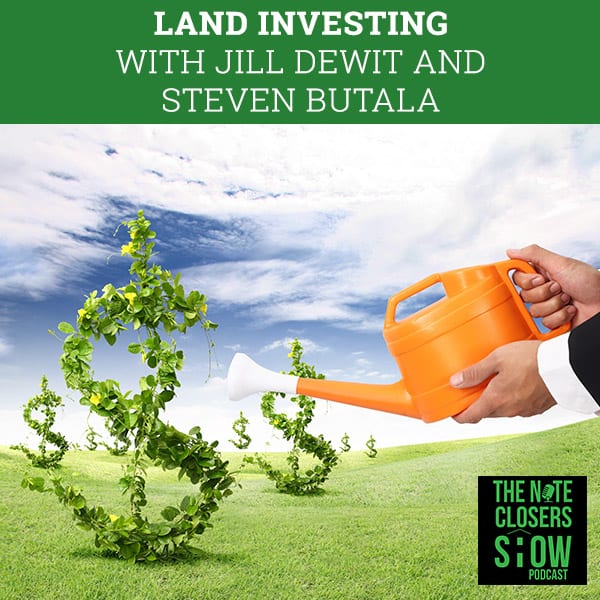
—
Listen to the podcast here
Land Investing with Jill DeWit and Steven Butala
I’m jacked up and excited to have our special guests joining us. You’re going to see them with our Note CAMP Commercial aspect of things. It’s been too long. We’re running a lot of similar circles. We’ve got similar friends. I seek them commenting on a friend’s post and vice versa back and forth. I knew when we decided to have Note CAMP Commercial, I had to reach out to these two rock stars and get them on here. We’re excited to have them on the show. We’ve got Jill DeWit and Steven Butala from LandInvestors.com. What’s going on?
It’s great to be here, Scott. Thank you. It’s long overdue.
Those that don’t know you out there, you’ve got an amazing podcast that I love and listen to out there. Talk a little bit about what your focus is and how you’ve made Land, the sexy niche that you love.
It’s anything but sexy. We’ve been buying and selling real estate since the ‘90s, specifically rural vacant land. We’ve done more than almost 16,000 deals. Around 2015, we got tired of answering this question, “How do you buy this cheap? Can you show me how to do it because I love buying real estate from you, but you’ve got to be doing it cheap or somehow?” That was the birth of Land Academy. Jill and I spent two or three months putting it together and then the podcast happened because it was a more efficient way to answer questions. Now we’re sitting in front of you.
I agree that the podcast is a great way. We’ve been answering a lot of questions and communicating out there. Let’s talk about that though because a lot of people shy away from land and there are opportunities there that most people are missing out.
In my whole career, I’ve heard some version of this sentence, “Why did you buy the land? You can’t do anything with it. It doesn’t generate any income.” My answer is, “Would you buy a $10,000 piece of land for $900 right now and then resell it for $5,000? That’s what we do.” Only add a few zeros now. It’s all about finding unwanted land. That’s the whole key.
By the unwanted land, what you’re saying is somebody is tired of having it or trying to move to something else. Is it right of all those things?
Over the years, we perfected how we buy a property. I call us a tech company that happens to buy and sell real estate. We, in a predictable manner, send out mass-mailed mail merge driven mailers in offers. For every 300 or so offers we send out, we buy a piece of property. There are a lot of different ways to do it and a lot of our members take on their own way. The most successful ones do it anyway. We scraped the bottom. We bought a commercial piece of property in Ohio that’s worth $900,000 retail for $50,000 because they didn’t want it any longer. They’re tired of dealing with it. There’s a garage sale mentality that I like to use where if people hold a garage sale, they’re not doing it because it’s a profit-driven thing. They’re cleaning out the garage. There are tons of people who inherit land or any assets for that matter. We do it with houses every week that don’t want it anymore. They’d rather get a check from us in a week or so and not deal with it. They know full well that they’re not getting top dollar. All they do is thank us.
When you say the garage sale aspect of things, that makes me think back to a few years ago. We start to see more of that where we had almost a garage sale economy for a while. Everybody got all excited about prices going up. They refinanced their house, they pulled the equity out, they bought toys and then the market went south. Now they need to sell their toys and try to make the mortgage payments. We’re going to see more of that.
If you pull up to a garage sale and there’s a shop room there that’s $25 at Home Depot, it’s doesn’t look like it’s ever been used and it’s got a $0.50 sticker on it, you’re probably going to buy it. The seller is not sitting around saying, “I know this is worth $25. I’m going to sit here and wait.” They’re happy to get it out of there. That’s exactly how we buy land. I’ll cut to the chase. Our secret is that there are two of us. I’m the data guy. I have a completely different skill set. When Jill and I joined forces, our numbers quintupled in acquisitions and sales because she’s good with people and on the phone and that’s not my forte.

Land Investing: If you get in your car and drive two hours in one direction, you’re going to get into a perfect place to buy real estate.
Jill, what do you think it is that makes you successful? Is it listening to people or is it talking to people and let them tell you what their underlying need is?
Quickly figuring out if you’re helping them or not, even on the buy side or the sell side. There are people that get an offer in the mail and they’re excited and ready to go. I’m here to help them and make it as easy as possible and take care of it for them. They’re hugging me and saying, “Thank you. I didn’t know what I was going to do with this. I want it off my plate.” There are people calling me who might be unhappy. They don’t want to sell and I’m not going to talk them into it. I say, “Thank you very much.” I wish them well and send them on their way. The whole thing is I always have said make my phone ring and that’s what he does. Whether it’s on the buy side getting the offers out there and good offers, they come. If I need more flow, we send more offers.
He’s got the pricing down to a tee. On the sell side, Steven is good with the marketing of it too. We’re all involved. We have a big team but at the end of the day, he’s got his hands in a little bit because no one knows how to do this posting as well as he does and make them look as good and do the videos. He directs our team on how to do that and that’s part of what we share with our community as well on how to do it too. Selling is easy. He gets my phone ringing there and that’s it. It’s important to quickly figure out who’s the tire kicker and who is your real buyer. You may have experienced this too, Scott. The guy that’s on the phone the longest with you and asks the most questions is probably not going to be the buyer. Your real buyer is the guy that says, “I’m moving money around. I need you to wire instructions. I’m going to send it at 5:00.” You have two phone calls like that and that’s it.
There are a couple of points there and that’s why I hit a couple of nuggets out there. Everybody tries to do things themselves. If you can partner up with somebody, it’s a true case of one plus one equals three. Not one plus one equals two.
It’s great because in our community with all the investors that we work with, I’ll talk to them on the phone and they’ll say, “I’m the Jill in the relationship and I’m the Steven in this relationship.” It does work out well. We tell people often too, especially much of what we do, the data does the heavy lifting so it’s not hard. Once you learn how to pick a county and price the mailers, we’re going to great detail that Steven has perfected. You know what you’re good at and what you’re not good at. If data is hard for you, get a data guy. If you need talking on the phone, that’s what Steven did. He got me because talking on the phone is not his thing.
All these systems I’ve devised over the years were all driven by the fact that I didn’t want to talk to anybody on the phone. Every mailer I do, I hone in my pricing then there are that much fewer people calling in and making it more efficient for Jill. She’s the absolute opposite. She starts down that verbal path with it and I can see it. I stand in her office doorway in awe often. She’s turned in a deal that never should be happening into a transaction.
The key is you have to listen and you’ll know if they’re the right person or not. Don’t try to talk them into something they don’t want or they don’t need. That’s going to backfire.
You can never force that hand there. You ask them leading questions and they’ll tell you yes or no and you go from there. Can you give a little bit of how you’re identifying these smaller counties or bigger counties? I’m sure it’s a mixture of a lot for you there. Steven, are you finding your bigger bang for the bucks the more the rural it is or the more the larger the populations?
Let’s use Manhattan, New York as an example and let’s talk about Chicago and Los Angeles, the three biggest cities in the country. In all three of those places, if you get in your car and drive two hours in one direction, you’re going to get into a perfect place to buy real estate for this. I will say this and I truly mean this from my soul. There’s no bad county to doing this and it’s all pricing and mailer yield. If you’re starting out, you want to be about two hours within an urban area. Think about a typical Craigslist buyer. We don’t sell everything on Craigslist and not even a majority. If you think of that mentality where they want to buy it cheap, they want to be able to drive through it on the weekend and they want to use it quickly, that seems to work out great. From there, I look for consistencies. You can drive two hours in a lot of different directions, but you want to find pricing consistency for all kinds of properties that are for sales like houses, land and everything. We teach that it’s one market working together.
Two hours away is not quite the path of improvement, but it is a little bit more. People are looking for something that they can go to on the weekends, hang out there and get away from the traffic in LA.
They are even used for the weekends. Some want to be off the grid and some want a place to put a tent and fish or park their RV on the weekends and things like that.
Hunting is a big one. The vast majority of the properties we sell are to wholesalers. We buy it cheap that we send groups of APNs to other people and they say yes or no. It doesn’t mask the fact that it still needs to be in a good area and it’d be a good piece of property. We’re doing all the work for the retailers.
With the commercial aspect of things, are you seeing a lot of the commercial stuff in those same areas or stuff that’s getting rezoned or things like that?
For commercial property, what we look for when it comes in is has it ever been marketed and the answer is almost always no. I start to look for proximity and traffic counts and everything else. I was a commercial real estate broker before I started all this. I’m familiar with what makes a commercial piece of property viable and we go to town on the pricing. It’s almost always the same story whether it’s residential, commercial or rural vacant land that’s unwanted. You sent out a few thousand letters and like clockwork, two, three or eight people call back and Jill turns one or two deals out of it.
Do you ever get properties that have been owner financed or defaulted debt that’s owners are calling you on this as well to look at buying that stuff?
I’ve never been a note buyer, but I’ve sold a lot of property that I’ve sold on terms, I let them mature, and then we sell it at a discount. We don’t do that too much anymore because we don’t sell property on terms any longer. We’re selling note properties on terms. We have tons and tons of members who do it successfully every single day. We came to the determination that we’re cash people.
There’s nothing wrong with that. I would agree with that too because when we buy a note or take a property back, people are like, “You could always do owner financing and sell on terms.” That’s not the main lane that I’m working at. I don’t want to get on the exit ramp. It takes away from my focus of getting down the road faster. People are always looking for a different alternative to find leads and stuff like that. I didn’t know if you saw a lot of it, but I can agree to that. What’s the biggest mistake that you see from people that are trying to get into this? They don’t send it out enough or they overthink it. It seems like once you’ve honed into your markets and the things like you talked about, it’s shotgunning the lead out.
It’s getting off the ground. Many people overthink it. They’re gun shy and they’re afraid. Once I send the offers out, they’re going to call me back like, “I don’t know. What do I do?” I’m like, “Never mind.” They know what to do. It’s that little fear factor. It’s doing your homework. We’re good about showing people well how to look at comps. Anytime I hear anyone say, “I made a mistake.” I say, “What happened?” They’re like, “I didn’t quite double my money. I only made 80% or whatever. I did it wrong.” I’m like, “Let’s all think about this now. How much did you make? You did fine.” Someone will get a little greed and they’re like, “I want to make 400%.” I’m Like, “We want to buy them right and sell them fast and move on.” We both feel this way. I want my buyer to feel good about this deal. I want them to think they got something fantastic and make more money and now we have buyers for life. That’s how we operate all of our businesses.
People that are successful with us have to unlearn everything that they’ve been learning about real estate since they were tiny little kids from their parents. Buy and hold, the path of growth, use a broker, and buy through an escrow agent and not a lawyer. We spend a lot of time and energy undoing all of that. When you look at a regular real estate deal that your mother-in-law might do who is not in the real estate business, there’s a ridiculous amount of excess of fees, time and a lot of unprofessional people that are trying to take a piece of the pie. This system that I came up with excludes all of that. The second thing that I see is this concept and this is a key ingredient of what we do.
When we send all these letters out and we reach all these people, the ones that are interested call us back. We wake up in the morning with a bunch of emails, a bunch of letters, a bunch of signed offers in the mailbox and all the work is done. Many people, specifically commercial real estate people who are successful, wake up in the morning and they go out and try to find a deal. They go out and don’t let it come in. Now you put yourself in a complete position of control. I can send out 10,000 letters, I can send out 80,000, I can send out 100 or zero. The biggest hang-up people have is they can’t get past that, “I got to send out mail.” Yet, it’s not free. If it’s free, they will do it.

Land Investing: The bank would rather deal with one person instead of 50 people.
If it were free, they probably still wouldn’t do it because free is no value.
They overanalyze their pricing. I’m like, “Move on. Get it out there. You’ll figure it out. You’ll tweak it.” Every time someone says that mailer bombed, I’m like, “What happened?” They’re like, “I only bought two.” You still bought them. How many did you get that you turned down? You’ll get that traction. If you price it all wrong and you overprice, now everybody calls you back. We’ve got to figure that out. Good news or bad news, everybody wants to sell, but you adjust. We teach this too. I talked about a lot like, “I goofed there. I looked at your property. It’s worth this. This is what I can do.” Often, it will work out when you’re explaining it properly. The opposite is true too. We have some people that do this on purpose, by the way. They’ll mail crazy offers to the whole state to see what comes back because they’re nuts. It is hilarious and they’ll buy stuff.
It works. They’ll buy a commercial piece of property in the center of the ZIP code in the most urban area for $180. It’s truly amazing.
Even to get the calls back and then they’ll figure out, “I’m in.” Instead of $500 a month, it’s $5,000 because it’s worth $50,000. They got them calling and you can fix that too.
It all comes in getting the phone or the emails to ring. It all comes in getting the marketing on the front end.
It’s much easier. I can’t realize that more people are still not using data this way. I don’t understand people. You still hear agents getting in their car with ten business cards in their pockets and they’re going to go knock on doors. I’m like, “Are you doing that?” Canvas the whole area.
That can work for certain people. This also works. If you walk into a casino, sit down at a thing, crank it, and win the first time. That’s a percentage. That’s possible.
We have such the same lines. There’s so much online data. There are many great places to dig in. I tell people like, “I bought a portfolio of notes and I’ve got this lot.” Why don’t you reach out to the whole neighborhood real fast? Do a quick mail merge.
That’s the best way we sell properties. We sell it to the neighbors.
One of the things that we see a lot of and we’re starting to see more of it coming back in from banks that are calling. They’ve taken some land back or they’ve got some stuff on the books they want to get off. They’re motivated to sell that debt at a cheap discount because that’s not their main focus of things. We’re the same thing. We don’t do a lot of direct mail. We do a lot of email blasts out to thousands and thousands of asset managers. It’s great to come in each morning and say, “We’ve got leads in this morning. We got leads in now or we don’t want to do it.”
Let the ones who are interested and serious contact you back. How much easier is that?
I have a question for you, Scott. I have to tell you a short story about my short note career. The only education product I ever purchased was how to buy notes. This was around 2011 because all the land stuff was going great. We’re buying and selling houses. We don’t renovate them, we wholesale them to people who renovate them. I’m like, “I need to expand.” I go on to eBay, buy this used package, and I love it. I got to the point where she said, “You’ve got to call the banks and get this list of asset managers,” and that’s where I stopped. You’ve obviously had a solution for that. How do you get those tens of thousands of asset manager list?
You could go on a website like LaneGuide.com. For $160 a year, look for REO. You can filter through by what they’re lending on and then they’ll often give you a list of asset managers. Some states in the country will publicize lists of mortgage bankers and banks doing this license to do business in that state. They give you the names, the phone numbers and the email addresses of a lot of these people. Texas is good because Texas likes to share that information. I could go on right now and pull 3,000 banks that are doing business here in Texas. 275 servicing companies all have the person either in charge of licensing or their email that I could market to and say, “Who’s the person to talk to?” I don’t spend much time on the phones. I used to spend a lot of times dialing for dollars. What I do now these days is we’ll send an email blast out and see who opened the email. We’ll follow that up with a phone call if they’ve opened the email two or three times using MailChimp or Infusionsoft to see who’s the most opened email. That’s usually the person who has something. They haven’t gotten around to replying back yet.
That’s what we use too.
We use Infusionsoft too.
If they click on it, then you’ve got them. Now you’ve got something. They might have something every month to us, but every month the same email goes out. We send it out once and we send an email out a couple of days later to those that didn’t open it the first time around in an opposite time of the day. If they’ve opened it, they get a different email campaign from us and then we’ll go from there. When somebody sends us a list, I like to send them a nice bottle of whiskey or something that separates me from the rest of the herd.
What’s a typical deal for you? Do you buy whole tranches or portfolios or one-offs?
It always varies on what we have. We got in a list of 200 semi sub-performing contract for deeds in 25 different states. We’re looking through those. I checked out 40 to 50 of them once we go through and it hits our numbers. A lot of people get stuck. When they get a list like that size, they’re like, “I can only make three or four offers because this is all I can afford.” I’m like, “No.” I’m going to make an offer on the whole list and control the tape because the bank would rather deal with one person instead of 50 people and it gives me a bigger book discount. I love doing this too. It falls in the last FFIC ugly assets. There’s no house on it. It’s a lot or something like that. I’ll buy the asset that you want me to pay full price on, but I want you to give me these five or six properties for free because I’ll wholesale them out. I’ll send the letter to the next door neighbors, “If you want to buy this on terms, give me $5,000 and a $10,000 and it’s yours.”
The contract for deed is the end of the line. It’s already been through nonperforming and all of that.
A contract for deed is usually on a lower value property sub $60,000 to sub $70,000 that can’t get a traditional bank loan. You had Fannie and Freddie Mac who is left with thousands of thousands of these low-value properties. They sold them off to firms like Harbour Portfolio and a few others who bought thousands of these. These funds went out and offered to owner financing terms. Put $1,000 down and you’ll have a 30-year 9.9% interest rate, but we won’t care about your credit. It’s a rent alone lease to own. The deed stays in the seller’s names for a while. I have a bunch of contract for deeds. It’s in a variety of entities. We have a 30-year mortgage at 9.9% but the borrower doesn’t get the deed until they’re paid off to me or get refinanced out. It’s like a traditional note. It’s that the deed is a little bit different. Each state is a little bit different on how fast you foreclose. We see a lot of stuff out there that people walk away. When I see bottom of the barrel stuff, we do direct marketing. We’d send a few postcards out to the bottom of the barrel lists. We get a lot of return, but all it takes is one person calling out of 100 postcards to make up for the whole mailing piece in it.

Land Investing: If you come home and your spouse is not behind you and what your side hustle is, it’s not a side hustle very long.
It sounds like you have a system like us. That’s great.
That’s the 21st century and not the nineteenth century. It’s all about systems. I like the joke that, “Scott is here to beat me up. Steven is going to beat me up or Jill is here to beat me up. Work smarter not harder.”
There’s never been a better time to do this than now. It’s never been easier to purchase real estate based on the data that’s out there and resell it. You can drop a pin anywhere in this country, get all the data for everybody who owns a real estate one or two miles around it, send them a letter and you’re going to sell the property that’s priced right.
That geomarketing aspect is awesome. I did a webinar about geomarketing to raising capital in an area. If you’ve got a house for sale, geomarketing from a mile to ten miles out to find the buyer for that house. You can do that via Instagram or Facebook and doing that. They came out with a statistic that said 50% of single-family residences that are sold to your friends and relatives of someone who lives a mile from that asset.
That’s the truth. They want to live near them. You told us how you got into this. Jill, what’s your previous background before you got into buying the land?
I grew up in Orange County. I was born and raised in Southern California and I watched it. My dad was a pilot and he chartered for a lot of these guys. We were in Orange County. We’re at the Newport Beach Boat Show and I said, “Watch for Cole everywhere. You’ll see Don Cole’s properties.” My dad used to fly for him so I watched it happening. My dad would invest a little bit and I tried to learn. My first full-time job was for a couple of developers and I loved it. They would buy the dirt either for office or strip mall and they would do the whole thing though. They would get the construction loan, build it up, lease it out and hang on to it. It was a small family-run company and I got to have my hands in a little bit of everything. I took a step away from that for many years because I was young and goofing off and wanted to travel. When Steven came along, it was like, “I know how to do this stuff.” It comes naturally to me and here we are.
We’re in the business of creating equity. There are only two ways you can create equity in real estate. Number one, you buy it for cheaper than its worth, which is what we do. Number two, you buy it and improve it, maybe lease it up or do a bunch of stuff that’s been going on since caveman times, and then you sell it. Both ways, we’re great depending on the personality type.
We’ve got some friends that are doing a lot of the development stuff. Do you see a lot of those opportunities springing back up in those areas on some of the larger plots of lands? Is that what you’re seeing or no?
I don’t track it. We track new housing starts because it seems to be more tied to the economy into what we do for a lot of reasons. For whatever reason, a lot of info lots with buildable properties that are between two houses in an area, there’s a lot of that in California and Arizona. We track housing a lot even though we don’t buy and sell a ton of houses. We do buy and sell a lot, but not as much as land. Tracking commercial development, we were talking about this. I want to ask you this. Are you concerned about the internet and commercial real estate itself? Fewer people are working in offices, fewer people want to drive to work, apartments always go up. What’s your take on that?
We’re going to see much more of WeWork executive suites aspect of things. It’s almost like a reverse. If you think about how we started in the United States, it was entrepreneurship. Everybody ran their own little job or shop or did their own little thing and then you had the industrial revolution where people start to work for everybody else. The whole solopreneur, that small mom and pop company, somebody who is starting online or we’re in a couple of executive suites, WeWork is a hot thing. We see that a lot in Austin here with the high tech jobs. People are taking an old Walmart grocery store and turning it into an executive workspace and subletting off a month at a time or six months or twelve months at a time. That’s a huge opportunity.
It’s getting more costly for a lot of people. If you can work from your laptop, that’s my goal here. I do everything basically from my laptop. I have an office here, but I can do my business from wherever I’m here in Austin. The house is five minutes away. I can work If I’m on a cruise ship or I’m in Europe working on some stuff. That’s the beauty of nowadays internet and it’s got to be less office-focused and more virtually-focused these days. With our education side, we stopped doing hotel workshops and started doing everything online through Zoom.
We have one annual live event and we don’t do anything else.
It’s because everybody wants to come and hang out once a year.
You’ve got to touch, rub elbows and high five to people. We had a Mastermind group where we had a bunch of our coaches who are going to hang out for a couple of days with us. We love doing those. It leads me to my next question. How valuable has the podcast been for you with driving leads? I imagine you get a lot of people that get referred out to the podcast and call you off of that too.
We’re going to hit show 1,000. I can remember a few years ago when it was funny because we didn’t commute. We could do it from anywhere. That’s part of our thing. This thing has got to be from the back of a boat. When he came in and said, “We’re going to do this podcast,” I was like, “What is a podcast?” Here we are and we’re about to start another show. There are one or two more shows that we are working on too.
To answer your question, it’s worked out great. There’s nothing more cost effective. I started the show in 2015 with guests like we’re on your show now. I was sick and tired of them not flaking out and not showing up. I don’t need to tell you this. Jill steps in when somebody canceled on us.
I was the fill in. I was the backup.
We got to the point where everybody is like, “Where is Jill?” It became the Jill show.
People buy more from women. They don’t have quite all day to have a talk at you and me and you’ve already admitted that you don’t like talking to people. I don’t talk to my borrowers.
I do that every day. I talk to wives and other female investors and it’s a little bit different.

Land Investing: There’s somebody there trying to reach you to buy or to sell. You’ve got to answer the phone.
We have a lot of couples in our group because of this.
They’re super successful. The bottom line is, we all know if your woman is not on board, this is not going to work.
It’s hard too. If you come home and your spouse is not behind on what your side hustle is, it’s not a side hustle long. We get a lot of people that start off part-time. They’re doing it 7:00 PM to 2:00 AM on the side and ten to fifteen hours a week then work towards leaving their job. Unfortunately, most people that don’t have the support of spouses because they burnt that bridge selling soap on a rope or something over the years.
We get questions from people about our relationship constantly like, “Are you guys together or is it some act?” We are together.
With my spouse, they were like, “Are you married?” I was like, “No, we’re happy.” Everybody knows Steph but she does not like to be on the show. She’s the VP of Operations. She handles all that stuff there. It’s the same thing. You’ve got to have that working cohesiveness. She works from home because I’m loud, which is the home is about 300 yards from the office here. I go home at lunch to check in and come home at night to check in. “Where are we focused on? Let’s turn off the business stuff and let’s have some fun.”
We could do a whole show if you can get your wife on. If you can get her in front of the camera, we’ll do a show with you. All I’m going to talk about is working with your spouse.
I think it’s a great idea. That’s an awesome thing. You’re each other’s Yin and Yang. You stick in your lane, she’s in her lane or you stick in your lane, she’s in her lane and your lane both because whatever is, yours is hers. You handle the data, I’ll handle the talking.
Having staff is life changing.
I’m sure with dropping those many mail pieces of marketing you are doing monthly, you’re not in there licking stamps doing it all yourself. You’ve got mailing houses that are doing that.
We own a company called Offers2Owners.com. It’s a commercial printing company. It’s licensed out with the post office and all that. We started that and it’s for our members. It’s open to the public for a different price. That’s been life-changing for us where we can control the mail for our members.
That’s a huge advantage though. We’ve got somebody else to get around to doing it in four or five days or a week or two weeks or three weeks. That’s huge.
It’s the same day, most of the time.
They came in by 2:00 or something. It will go out that day.
It’s for us. It’s for people who are sending offers. It’s not like a bulk mail company for door hangers and stuff.
That’s systemized and specific on it.
We’re the only licensed providers of the top three data solutions. We share that with our people.
DataTree, TitlePro247, and RealQuest, we’re licensed providers of all three and we’re in discussions with two additional companies that are a little bit more obscure for different product types.
What’re your big goals? You said you’re doing this off back of a big boat somewhere. What are your big goals going on for the next couple of years?
House Academy is coming out. That’s our biggest thing. The success we’ve seen with Land Academy, more like I’m hiring crazy prepping for this. Not a lot of people understand the land part of it, but they see it with houses and then to learn how to do this with that type of an asset. That’s going to keep us busy. I am sure.
From our deal acquisition standpoint, I look at it as acquisitions because the sales are now automatic with her. I like to see that increase dollar-wise by least 10% a month. That seems to be doing it with the people that we have in our staff that does it on its own. In my spare time, I’m looking for new creative ways to market all the services and the real estate that we provide like Facebook Marketplace or a different way to Twitter something and all that stuff.
I was on the phone with a friend who no longer buys or pays for demolition on rehabs. She markets at Facebook Marketplace the dirty carpet, the sinks, the cabinet. She puts them on there and sits there on her phone at the house and people come in and take it and pay her for it. She uses that as her bar tab. She buys and sells on finance mortgages, but I call her Kristin Gerst the dirty carpet queen. She’s like, “I’ve got $100 for this piece of crap stained cat-pissed carpet from somebody.” I’m like, “That’s awesome.”
I bet they show up right then too.
She’s downstairs or outside for the $15 corners middle stainless steel sink.
That gets me thinking. It seems like there is an Uber component to that.
There is an Uber component to that. We can get Uber everything these days basically from your weed to your seed or whatever you want. It’s crazy that way. With where the market is going, I foresee the market taking a downturn here in the next twelve to eighteen months. I don’t think we can keep going up and up like we are. How does that affect you? Does it lead to more deals as people are motivated to sell stuff off faster like it does for us or you have a transition process because people are trying to figure things out?
Here’s our sale price right now and here’s our buy price. This will be my fourth downturn in my real estate career. Here’s what’s happens. This goes down and this goes down. That’s it.
Do you see increased inventory?
Yeah, but we paid cash for everything. We have to hold onto what we do. Wholesaling houses when times get tough is the last downturn, which was the worst. I don’t think it’s in our lifetimes, but we won’t see another one like that. Around 2011-ish, we almost got annihilated financially and what saved us is buying houses and reselling them. We’re buying houses on the west side of Phoenix for $20,000 or $30,000 and selling them for $60,000 or $70,000. Those are the same houses now that are $250,000 to $300,000.
I buy a lot of debt on those same price points, buying debt, working thrown the foreclosures, doubling what I paid because you couldn’t build a house for what we were buying and selling them for.
It’s way below replacement value and below the land value. You have to adjust and believe in yourself. Jill and I lost a lot of friends for a lot of reasons back through that time where they got out of the business or whatever. All they had to do is have a little bit of confidence about changing gears. People sometimes can’t change anything.
They can’t adapt and overcome. When you start talking about technology, that’s the easiest way to adapt and overcome these things because it’s all at your fingertips these days. It’s much cheaper.
One of the first things I ask anyone that’s getting into this business is, “Are you comfortable sitting in front of a computer and trying new stuff eight to ten hours a day for the next few months?” You can see it right away. “I don’t understand Excel.” They’re not going to make it. We’re at a point now in our careers and our agent stuff where that’s about it. We all stop right there because you have to learn Excel. This is not the business for you. There are tons and tons of convenience stores available to purchase.
Excel and marketing, those are the two things that are going to drive in the next several years plus when it comes to thing. When you start seeing companies like Zillow and KW, it’s starting into the online buying aspect of houses. There was an article where Amazon had a page up to buy and sell real estate and they took it down briefly. They’re using technology and they are using lead sources to help find stuff. If you’re not using those things, you’re going to eat a price out of the market or you’re going to be pumping gas at Circle K.
Our biggest competitor for houses, if we had to name one, is we buy ugly houses and every ten deals that we put under contract, we have to come up against them. We can see it immediately. I’m like, “Take it. I don’t care.” They’ve been around way longer than us and probably longer than everybody. There’s always competition. When you have somebody that cares enough like Jill does to talk to the seller or in her case most of the time the staff, if it gets to her, there’s some reason for that. You’re setting yourself up into a whole different situation. Every seller I talk to, I ask them, “Do you get a lot of offers on this asset?” They all say, “We do, but not unlike yours. None that have an actual purchase price and closing time and a frame.”
They don’t have somebody who answers the phone.
Answering the phone is still the key ingredient. That’s why he’s not answering the phone is what you’re saying, Jill?
Somebody is answering the phone. They’re afraid. You’ve got to answer the phone. There’s somebody there trying to reach you to buy or to sell. You’ve got to answer the phone.
What’s the best way for people to reach out to you or find more about everything you’re doing with the land and the podcast?
It’s all center on LandAcademy.com. That will get you everywhere you need to go. We have an online forum that’s completely free called LandInvestors.com and incredibly popular. It’s like BiggerPockets for what we do. We’ve got offers to owners of course, but it’s all easy to get to from LandAcademy.com.
I appreciate you spending time with me. I enjoyed this. I’m looking forward to having everybody on Note CAMP Commercial talking about that and sharing some stuff. There are multiple ways to dive into real estate. This is a great way and a largely untapped part of what people should be looking at. Everybody loves going after pretty houses, the fix and flips, the HGTV or the fictional shows, as I like to call those. There are still a lot of great deals we made and a lot of motivated sellers when it comes to land. I’m honored to have you on the show and I’m looking forward to spending some more time with you and get to know you better too.
Let’s make a habit of it, Scott. That’d be great.
Thanks. I appreciate it.
See you soon.
Go check them out. You’re going to love it. Check out their podcast. I love their podcast and everything they’re doing out there. You cannot go wrong by learning as a facet of land and how to make that stuff work for you guys because you’re going to see it regardless of what you’re doing. You might as well learn how to use it versus let it get swept up under the rug and not do something with it. Go out, make something happen, and we’ll see you at the top.
Important Links:
- Note CAMP Commercial
- LandInvestors.com
- Podcast – Land Academy
- Land Academy
- Craigslist
- LaneGuide.com
- MailChimp
- Infusionsoft
- Fannie
- Freddie Mac
- Harbour Portfolio
- Don Cole
- WeWork
- The Note Mastermind
- Offers2Owners.com
- DataTree
- TitlePro247
- RealQuest
- House Academy
- Kristin Gerst
- Zillow
- KW
- BiggerPockets
- http://www.LandAcademy.com
About Jill DeWit and Steven Butala

 Since 1999, professional investors Steven Jack Butala and Jill DeWit have completed the acquisition and sale of more than 15,000 properties without incurring any leverage or debt. They continue to purchase property daily for immediate resale by sending strategically priced offers to owners for less than the current wholesale value. Through Land Academy and House Academy, Steven and Jill share their experience and access to professional level resources with the real property investment community.
Since 1999, professional investors Steven Jack Butala and Jill DeWit have completed the acquisition and sale of more than 15,000 properties without incurring any leverage or debt. They continue to purchase property daily for immediate resale by sending strategically priced offers to owners for less than the current wholesale value. Through Land Academy and House Academy, Steven and Jill share their experience and access to professional level resources with the real property investment community.

